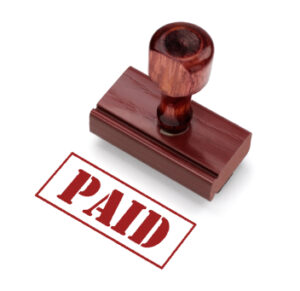CMHC Loan Insurance – How It Works and How it Can Be Improved
June 22, 2010Mortgage Financing for Vacation Properties and Second Homes
July 6, 2010Estimating your closing costs after the excitement of buying your home is about as appealing as sorting out travel insurance after you’ve booked your dream vacation.
That said, closing costs are unavoidable (unless y ou know something I don’t) so the best approach is to prepare for them ahead of time.
ou know something I don’t) so the best approach is to prepare for them ahead of time.
The old rule of thumb for closing costs was to conservatively assume that they would account for approximately 2% of your purchase price but with Toronto’s new land transfer tax and HST being applied to new home purchases, that approach is somewhat dated.
[Shameless plug alert] Thanks to the wonders of technology and the help of a programmer in India who converted my homemade Excel spreadsheet to JavaScript, you can now use my one-of-a-kind calculator to get a very accurate estimate of what your closing costs, including rebates, will be (it even has a demo).
Today’s post will give you a brief explanation of closing costs and then I’ll close with a couple of insights that I think every home buyer should hear.
Closing Costs for Every Buyer
Land Transfer Tax: This is usually the largest single charge. It’s calculated by taking your purchase price and multiplying it by a table of rates that rise with the purchase price. The top rate of 2% kicks in after $400,000, which means you pay 2% in tax on every dollar that you spend over $400,000. I know. Ouch. At least first-time home buyers get a rebate of up to $8,450.
Legal Fees and Disbursements: The lawyer’s fee for his/her time can only be estimated until you get a quote. Don’t be shy to ask for one. Fees vary widely from lawyer to lawyer and they are often based more on law firm policy than on difference in service. Ideally, use a firm that is personally recommended by someone you trust. Standard disbursements include title insurance, registering the deed and mortgage charge, performing a title search and preparing your tax certificate. Each disbursement includes a standard administration fee with the lawyer’s time added on top. [Note: when costs are estimated, our calculator gives you a range that adjusts based on your house price – it’s not exact but it gets pretty close.]

Closing Adjustments: These are reimbursements to the seller for any payments that were made for a period extending beyond the closing date. Put another way, you are reimbursing the seller for the portion of each charge that applies to the time when you are the owner. Examples include property taxes and condo maintenance fees.
Interest Adjustment: Lenders like to start mortgage contracts on the first of the month, but buyers and sellers aren’t as regimented. Your interest adjustment cost covers the period between your closing date and your first scheduled payment (which if you choose to pay monthly is the first day of the following month). It works out to a little less than you would be paying if your mortgage term started on the same day you bought your house because it doesn’t include any principle repayment (it’s an interest only charge).
Fire Insurance: If you need a mortgage, your lender will insist that you have fire insurance. This isn’t a big upfront cost because you can pay it monthly, but you have to prove you’re covered before the lender will advance funds on your behalf.
Closing Costs for Sub-groups of Buyers
Toronto Land Transfer Tax: Anyone who buys a house in Toronto has to pay an additional land transfer tax. It’s a sliding scale again and the top rate of 2% also kicks in on any dollar spent above $400,000. Double ouch. First-time home buyers can get another rebate on this tax as well, which makes me wonder whether I can put my next house in my 4-year-old’s name. (Just checked…I can’t.)
Mortgage Loan Insurance: This was the topic for my last post. If you have a down payment of less than 20% you have to pay for mortgage loan insurance so that if you default on your loan, the lender gets reimbursed. It’s based on a sliding scale where the smaller your down payment, the higher your insurance fee (CMHC is the largest provider). The fee is calculated as a percentage of your purchase price and you can add it to your mortgage balance, but you have to pay PST (8%) on the fee at closing.
HST for New Home Buyers: If you buy a new house after July 1, 2010, you have to pay HST. All buyers get a rebate of $24,000 regardless of the purchase price, which is the same as paying no tax on the first $185,000. Some builders are including the HST in their sale price, so be sure to check.
purchase price, which is the same as paying no tax on the first $185,000. Some builders are including the HST in their sale price, so be sure to check.
New Home Warranty Program: New home buyers are required to enrol in the Tarion New Home Warranty program. Your premium is based on your purchase price (here is the fee table) and covers you for the first year. Some builders also include this cost in the sale price but otherwise you will have to pay the fee at closing. As an example, the program fee for a $500,000 home would be $1,300.
Status Certificate: Condo buyers need to pay for a status certificate, which their lawyer will review at closing. It includes the condo corporation’s financial statements and bylaws and it will give you a sense of the overall financial health of the partnership you are about to join. Your lawyer will use this document to gauge the probability of a significant increase in your condo fees. The good news (aren’t you ready for some good news on closing costs?) is that the fee for this certificate is capped at $100.
There is one other item I think you should pay for, even though it’s optional and even though the last thing you probably feel like doing right now is increasing your closing costs further. Buy Title Insurance. On a $500,000 home it’ll cost you around $250 and, a lot of the time, it will save you at least that in reduced legal fees because it eliminates the need for a compliance letter and/or a land survey, which can easily cost $1,000. Also, it will protect you against title defects, forgery and fraud. (Remember the stories from last summer about fraudsters taking out mortgages on the properties of unsuspecting people?)
Lastly, estimate your closing costs upfront and include them in your purchasing budget. Too many people wait until they’ve signed a purchase  and sale agreement and then the money has to come out of their budget for new carpets and curtains. With a good closing cost calculator [ahem] it’ll take you five minutes to come up with a fairly accurate estimate of how much you should set aside. At closing, your stomach will thank you.
and sale agreement and then the money has to come out of their budget for new carpets and curtains. With a good closing cost calculator [ahem] it’ll take you five minutes to come up with a fairly accurate estimate of how much you should set aside. At closing, your stomach will thank you.







